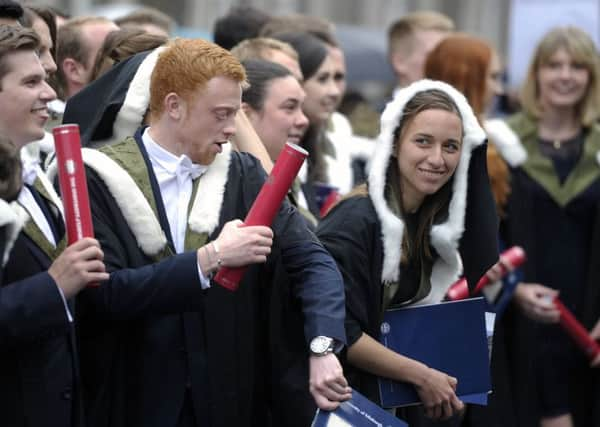Brexit: Edinburgh universities face £36m research funding cut


Across Scotland, 13 per cent of all research funding for universities comes from the EU, and in the run-up to the referendum there were warnings that, in the event of Brexit, it would be difficult to plug the gap and avoid long-term damage to research and education.
Edinburgh University receives by far the biggest slice of EU research funding among Scottish universities – more than £29 million last year. Heriot-Watt received £5.3m, Edinburgh Napier £1.7m and Queen Margaret University £166,000.
Advertisement
Hide AdAdvertisement
Hide AdEdinburgh South Labour MP Daniel Johnson said: “One of the strongest arguments for continued membership of the EU was the contribution made to research funding at our universities.
“And of the many things we need urgent clarification and a clear plan on is what we will do to support our universities.”
Scotland’s universities receive a total of £94m of research income every year from EU sources.
Edinburgh University principal Sir Tim O’Shea said: “These are very early days in the aftermath of this very significant decision but clearly whatever happens during the negotiations to come will have major implications for the higher education sector as a whole and our core activities of research and teaching.
Advertisement
Hide AdAdvertisement
Hide Ad“Edinburgh is and always will be a truly global university and I think it is very important to stress in times of uncertainty the stability and strength of the institution both financially and also in terms of its reputation.
“All the indicators of success, whether they be research excellence, student recruitment or partnerships with industry, show the university to be in a very solid position from which to face the changes and challenges ahead. Our priority will be to maintain our research and exchange partnerships across Europe.”
All four of Edinburgh’s university principals publicly backed staying in the EU.
Professor Petra Wend, of Queen Margaret University, was on the advisory group for the Scotland Stronger In Europe campaign,
Advertisement
Hide AdAdvertisement
Hide AdAnd Sir Tim, Heriot-Watt’s Professor Richard Williams and Professor Andrea Nolan of Edinburgh Napier University all put their names to an open letter highlighting the positive case for Remain.
The universities also moved to reassure students and staff from other EU countries that nothing would change immediately in terms if their immigration status or fee arrangements.
Edinburgh currently has 4512 undergraduate and postgraduate from EU countries. And Heriot-Watt said around 1000 of its 9000 students were from the EU. The number of EU students coming to Scotland has been increasing, from 7.9 per cent in 2009-10 to 9.5 per cent in 2013-14.
Sir Tim said that, as things currently stood, there would be no change for EU students arriving in 2016-17 and 2017-18 for the duration of their studies.
Advertisement
Hide AdAdvertisement
Hide AdAnd on staff, he said: “While there will be no immediate impact on work colleagues who are EU nationals, we realise that this period of uncertainty is stressful for colleagues and their families.”
A spokeswoman for Heriot-Watt said it was a global university with strong and abiding links across Europe and the rest of the world.
She continued: “Nearly half of our Scottish campus students come from abroad and around one in ten of those are from Europe. Our academic staff are leaders in their fields and many of those are from Europe and more widely around the globe.
“The decision by the UK electorate to leave the European Union has not changed our mission or curbed our enthusiasm to work with partners in Europe and beyond, welcoming international students and staff and delivering world-leading research with European and global partners.”
Advertisement
Hide AdAdvertisement
Hide AdAn analysis of research funding before the referendum by Digital Science said: “In the event of Brexit, it is uncertain that the EU would continue to allow the UK to apply for funding from the research community in the same way. Just 7.2 per cent of the research funding awarded by the European Union and the European Research Council has been allocated to non-member states in the last decade.”
And while it acknowledged money saved from the cost of EU membership could in theory be invested to support UK research, it argued “significant political efforts” would be needed to make up the gap and avoid long-term damage.
EU funding supports a wide variety of research projects.
Edinburgh University’s School of Informatics received 2.9 million euros from the EU’s Horizon 2020 fund to assist with its Health in My Language project, which translates NHS public information into a variety of languages.
It uses fully automated machine translation but the software can ensure a highly accurate translation of the original information on healthcare issues and can cope with languages which are “challenging” to translate automatically, such as those found in central and Eastern Europe.
Advertisement
Hide AdAdvertisement
Hide AdMeanwhile, First Minister Nicola Sturgeon is to meet diplomats and business leaders next week to discuss the impact of Brexit on Scotland.
She will host a summit for consuls general of EU member states at her official residence, Bute House, on Tuesday. And the same day she will meet leaders of Scotland’s business organisations.
But a new report today warns Scotland’s economic growth is set to plummet next year as a result of the Brexit vote. The study by MacKay Consultants said the referendum decision, on top of the recession in North Sea oil and gas, would see Scotland’s gross domestic product (GDP), which fell from 2.5 per in 2014 to two per cent last year fall to 1.6 per cent this year, before edging up slightly to 1.8 per cent next year.
The Scottish Parliament’s European and External Relations Committee is to commission research on the implications of Brexit and, in an unprecedented move, will meet during the summer recess for special evidence sessions, inviting UK ministers and Ms Sturgeon to be quizzed.